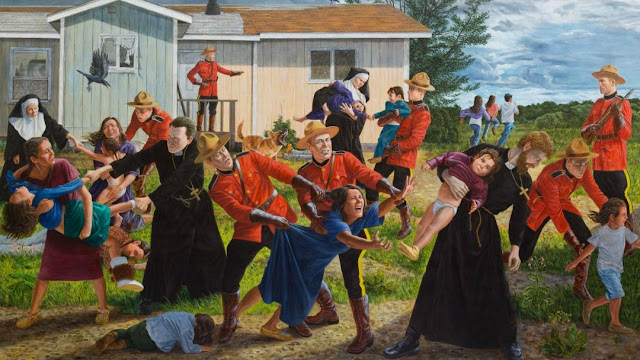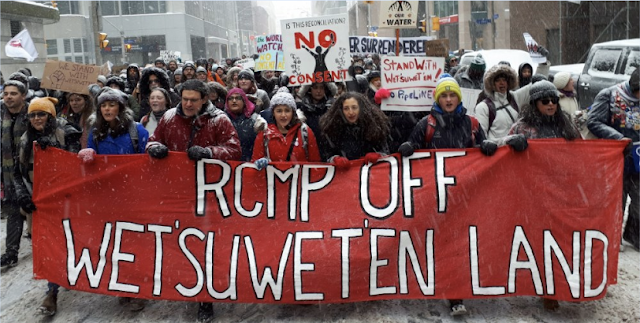150 years ago in 1873, the North-West Mounted Police (NWMP) were established to maintain peace and order in the Canadian North-West territories following the handover of Ruperts Land to Canada from the Hudson's Bay Company. Spurred on by the recent Cypress Hills massacre where a group of American bison hunters/whiskey traders had slaughtered 30 Assiniboine warriors, women and children and, fearful of U.S. Army intervention if the Assiniboine retaliated, the NWMP combined military, police, and judiciary functions in a highly mobile, group of mounted riflemen. Although they got off to a rough start establishing their base of operations the NWMP quickly stopped the whiskey trade and earned the support of various First Nations in the process. However with the passage of the Indian Act in 1876, relations with First Nations quickly deteriorated.
Thoughts on happenings that in some way connect to the Vancouver waterfront - by Nelson Quiroga
Friday, June 2, 2023
Time To Abolish The RCMP
But all of this pales in comparison to the RCMP's complicity or role as truant officers for the Canadian Indian residential School system from 1920 - 1996 (in 1920 the NWMP became the RCMP). Using force to assist Indian agents in taking children away from their parents and placing them in the various now notorious schools, the RCMP were direct participants in the cultural genocide of four or more generations of Indigenous people. Enforcing the pass system also prevented parents from visiting their children and stopped the children from returning home.
But by far the greatest modern stain on the RCMP track record is the inaction and cavalier approach to dealing with the shocking number of missing and murdered Indigenous women. Although Indigenous women make up only 4% of Canada's female population, they make up 24% of all the murdered women. While activists claim there are thousands of improperly investigated cases of missing and murdered women owing to police bias and racism, the RCMP themselves have acknowledged over 1,000 murdered Indigenous women over the past 30 years while the National Women's Association claims over 4,000. The RCMP claim they have solved 80% - 90% of all cases which still leaves over 100 unsolved including the 20+ along the infamous Highway of Tears in northern B.C.
Brenda Lucki
Then of course there is the violence and sexual assaults against female RCMP officers by their male counterparts that has now resulted in a class-action lawsuit against the RCMP by the over 500 women who came forward to represent over 3,500 claimants. All this while the RCMP is headed by a woman, Commissioner Brenda Lucki, who is helpless in dealing with the systemic racism, homophobia, and sexism that make up the force's culture. And while women make up over 21% of the RCMP, only 7% of the force are Indigenous people.
And to cap things off there is now the ongoing investigations into multiple members of the Prince George RCMP for the killing of an Indigenous man while in police custody and, even more disturbing, the sexual abuse and harassment of at least 10 Indigenous girls that involved a now deceased judge and a number of police officers. The worse thing about the case is the cover ups, obstruction of justice, and destruction of evidence that has been going on for 20 years since it was first reported and the lack of any charges being filed against the officers involved in spite of repeated promises to look into the matter. It took a retired RCMP officer to file a complaint with the Civilian Review and Complaints Commission to finally get a 33 page report produced that eviscerates the RCMP and then sat on Commissioner Brenda Lucki's desk for three years before the sordid story went public and was then handed over the BC First Nations Justice Council to decide next steps. But the Prince George debacle with Indigenous people is only the tip of the iceberg, with similar cover-ups and obfustications being played out at detachments across the country, most notably in Saskatoon, Winnipeg, and Thunder Bay to name a few.
Clearly after 150 years the RCMP have outlived their usefulness as a force to deal with Indigenous people and it's time to look for an alternative model. Whether or not we even need a federal police force or one that more closely resembles the FBI is another question. With First Nations people overrepresented in the criminal justice system as both victims and offenders something needs to change. Despite making up less than 5% of Canada's total population, they make up 32% of the country's prison population. Perhaps a local police force made up of Indigenous people would be more in touch with the people it seeks to protect and could help bring down the crime and incarceration rate. If nothing else it would address the systemic racism that has permeated the RCMP since its inception. The RCMP are never going to change their culture so instead of waiting for that to happen the time has come to simply abolish the institution.
Subscribe to:
Post Comments (Atom)








No comments:
Post a Comment